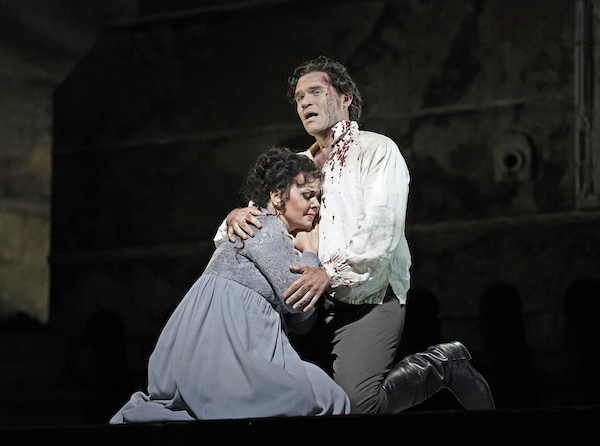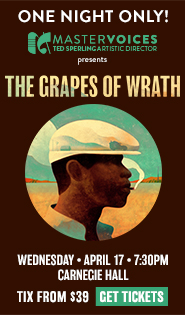Kurzak provides most of the heat in Met’s simmering “Tosca”

Tosca is not just an opera—the title itself is a one-word stand-in for how opera is imagined in popular culture.
Like Miles Davis’ Kind of Blue, it’s the opera that people who aren’t interested in opera go to see. Beyond the magnificent score, it’s a sure-fire theatrical crowd pleaser.
That is the most useful way to look at the Metropolitan Opera’s revival of David McVicar’s 2017 production, which opened Tuesday night. This is a solid, decorative period staging that provides everything the musical drama needs. That means it depends on the singers, conductor, and orchestra to set fire and create a memorable night at the opera. But for this opening, at least, Tosca mostly just simmered.
In the title role is soprano Aleksandra Kurzak, with tenor Michael Fabiano as her lover, the painter Mario Cavaradossi, and baritone Luca Salsi as the villainous police chief, Baron Scarpia. In the pit was Carlo Rizzi, rounding out the principals for this fall run (Tosca will return in early spring with a different cast and conductor). Of these, Kurzak was outstanding and consistent throughout the evening, while the supporting cast and conductor had inspired moments, but also unfocused ones.
The watchword all night was modulation, moving from one dynamic level to another, changing tempos, even turning the emotional heat up and down. Kurzak did this with elegance all night. Her voice was clear, full, and ringing from the very first note, her attitude self-possessed and at ease. With her voice and her stage presence, she moved so easily from serenity to agitation, from happiness to despair, that one only watched and listened to her. Tosca is a figurehead for the hyper-emotionalism that draws so many to opera, and is easy to clothe in nothing more than manner; Kurzak nailed the role without any sense of extremity or waste.
This began and ended with her singing, and “Vissi d’arte” was the shining example. There was a feeling of understatement in the first phrases, Kurzak keeping both the dynamic and the size of her voice slightly lower than is typical. She let the inner beauty of the character come through by smoothly modulating each detail, turning up the passion and power, while also keeping everything away from the edge. With sensitive, responsive accompaniment from Rizzi and the orchestra, this was a gorgeous performance, musically beautiful and emotionally real and relatable, with a palpable feeling of regret.
The rest of the performance never quite reached this level of polish and meaning. Fabiano was greeted with applause before his very first note—and his mere singing of the word “Vittoria” in Act II brought out “Bravos!” His “Recondita armonia” was strong but uneven, out of synch with Rizzi at times, rushing with a step-wise, rather than legato, sensation of changing speed and expression. Moments of intensity came with such sudden abruptness it left the listener trying to catch up to where the performance was.
Yet these were isolated moments and Fabiano’s “E lucevan le stelle,” was excellent. Fabiano has a prototypical Puccini tenor, warm and rounded and slightly boyish, and his own personal soulfulness is ideal for a character who, like Tosca, is driven by feeling rather than reason. His sorrow and pride in Act III were show-stopping.
Salsi (who will be replaced by George Gagnidze starting October 19), and Rizzi were together and separately, all over the place. There were technical issues in Act I as singer and conductor tried to find a mutual downbeat as Scarpia stalked around the church. In Act II, the character’s central moment, Salsi sense of phrasing and articulation sounded both arbitrary and willful, as if he were still making up his mind how he wanted to sing the part. This also affected his intonation at times, and though one could pick out a lovely timbre, it was difficult to pin down a focused vocal quality and the character as a whole, which diminished the overall drama.
The same was true in the pit. The orchestra sounded superb all night, precise and colorful from moment to moment, yet the score came off unevenly. The “Te Deum” was sumptuous, but then in Act II the off-stage cantata was so loud it nearly drowned out the music in the foreground. The bumpy transitions in tempo meant that some orchestral phrases scattered off in random directions.
All this was mostly ironed out by Act III, which was technically adept but also felt dramatically thin when neither Kurzak nor Fabiano were singing. The false brightness in a lot of the music was there, but there wasn’t enough tension to balance it.
Patrick Carfizzi has become the Met’s go-to Sacristan, and he showed why with his typical balance of strong, clear singing and a natural, easygoing stage manner; he was both serious and comical. Bass-baritone Kevin Short sang Angelotti with no-nonsense vitality. Their performances contributed to some of the most focused stretches of music making in Act I.
One expects many of these issues, especially coordination between singers and orchestra will get settled, hopefully with the arrival of Gagnidze. And the handsome literalness of the production presents the drama well. Tosca-goers, as they were Tuesday, will be more than pleased.
Tosca continues through November 4, then returns March 30-April 15, 2023. Roberto Alagna sings the role of Cavaradossi October 31 and November 4. Liudmyla Monastyrska sings the title role in the spring (except for Angela Gheorghiu April 8 and 12) with Yusif Eyvasov as Cavaradossi and Zeljko Lucic as Scarpia; Domingo Hindoyan conducts. metopera.org



